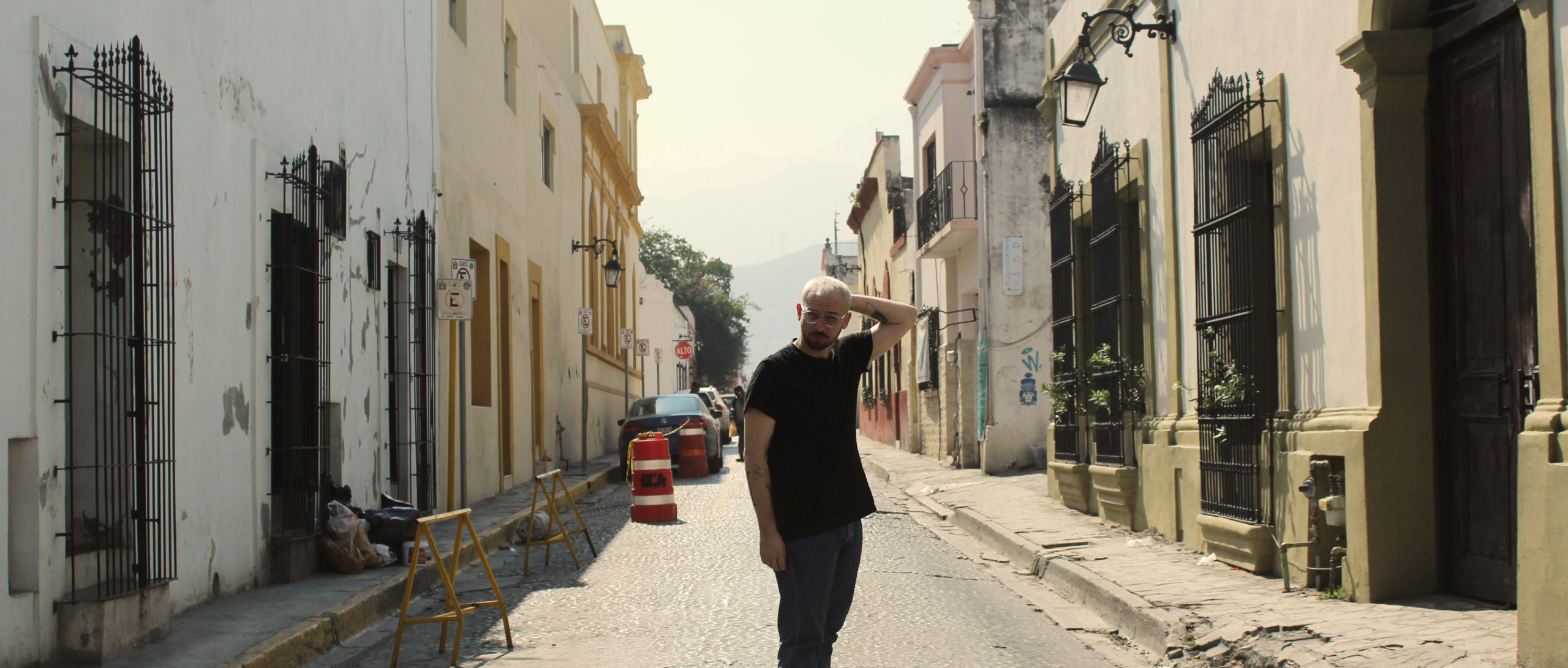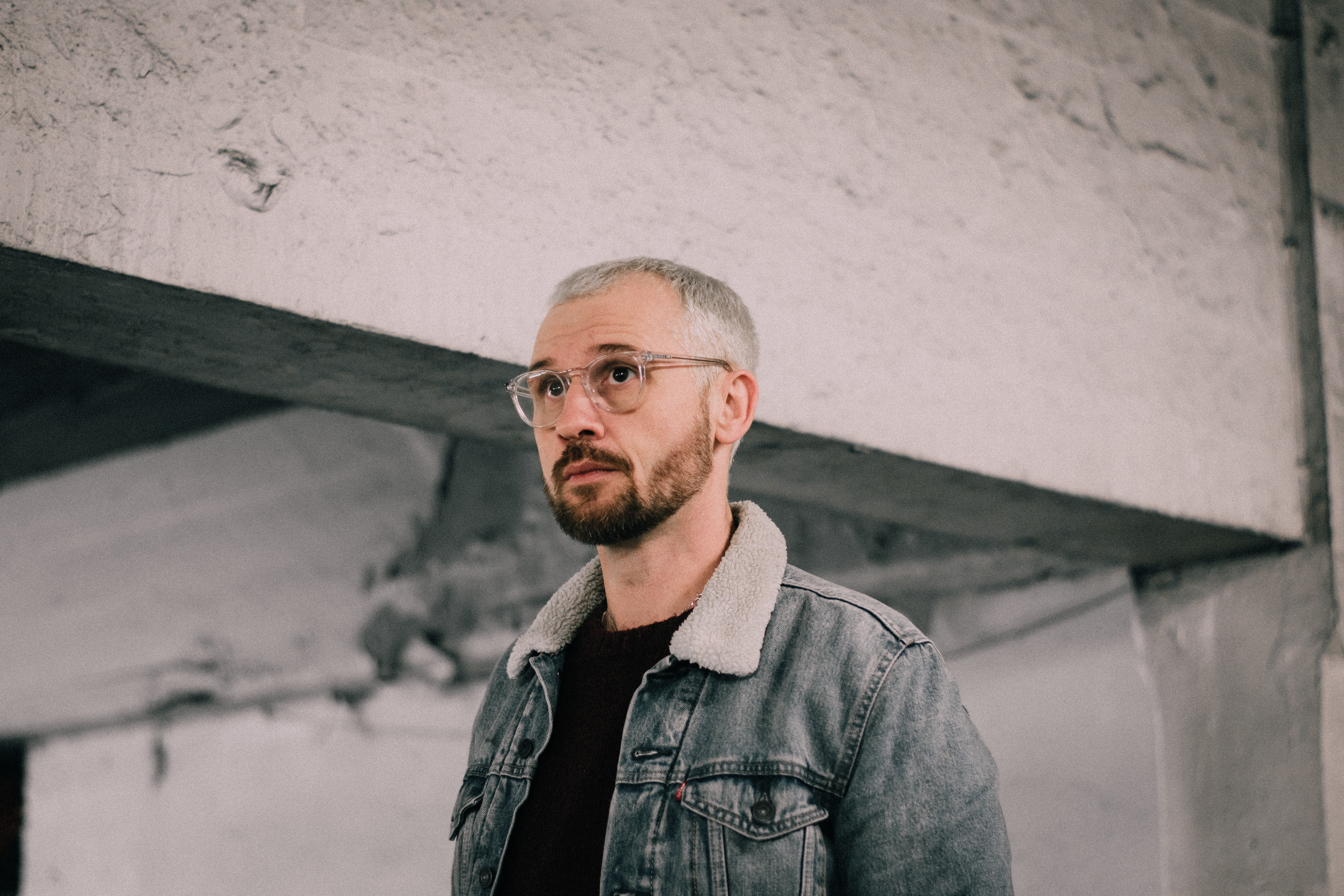Artist Tips: Man Power
Geoff Kirkwood advises on identity, ego, and protecting your mental wellbeing in music.

Artist Tips: Man Power
Geoff Kirkwood advises on identity, ego, and protecting your mental wellbeing in music.
Like so many musicians today, Geoff Kirkwood—Man Power—is too familiar with depression and anxiety, two long-standing mental health issues that remain highly prominent but stigmatised, especially among males in the music industry.
Originating from the North of England and now based in the beautiful Mexico, you would have no reason to believe that he, too, had fallen victim. He tours the world, spinning records for a living—think Panorama Bar, Fabric, Glastonbury—and draws acclaim for his broad tastes and eclectic style that takes in everything from house and techno to mutant disco, post punk, new wave, and experimental electronica. To top this off, he runs Me Me Me Records, a platform to release music of friends and artists in his orbit, among them DJ Tennis, Red Axes, Axel Boman, and Pional. From the outside looking in, it’s easy to ask: how and why?
Kirkwood, however, has this clear in his head. “…the fragility a lot of artists experience is a direct result of putting everything out there about themselves in to the public domain for the whole world to tear apart or, even worse, ignore,” he explains. “The major thing I’ve come to realise is that you need to control your relationship with your art and the business of selling it.” In a candid conversation, Kirkwood offered to elaborate on this point, explaining how he’s learned a few simple ways of thinking to ensure that the process of making a living out of his own creativity doesn’t “swallow” him whole. This is what he had to say.
For the purposes of this piece, I’m going to link DJ and producer as the same thing (and, for ease, I’ll refer to the people who do both as artists from here on in). I know there are many people who choose to do only one or the other but I don’t so I can’t speak with much authority on that. Additionally, as the monetary returns for music continue to dwindle, producers are relying more and more on DJing income to pay their bills, and DJs are also relying more and more on production profile to get gigs, so the two are inextricably linked, in my mind anyway.
It’s quite easy to mock artists for finding any difficulty in their work or personal lives. In fact, there’s an entire twitter account devoted to it, and #djscomplaining is so fully adopted into the digital lexicon now that I’m sure I’m not alone in screening my every online comment to make sure I can’t be perceived as being ungrateful in anything that I say.
I get why people dislike seeing artists complain about their lives. So much of modern PR is based around a smoke and mirrors approach to social media, and if you spend your time projecting via Instagram that your life is constant succession of amazing gigs, mind blowing dinners, and otherwise #blessed experiences then you can’t expect people not to be a bit pissed off when you have a meltdown just because you don’t like the headrest on the airline you’re using.
The upshot of this is that artists are in a position where the industry expects them to post about how wonderful their lives are, but they aren’t permitted to balance this by talking about any negative experiences for fear of being pilloried for being ungrateful or entitled. I’m not sure that this situation will change any time soon so it feels time to create a conversation about how artists can protect their mental well-being on a personal level, as seeking that support from the wider online community appears to often have the opposite effect than intended.
In the last two years I’ve had my own battles with depression and exhaustion. A lot of this has been driven by the fact I live in Mexico, and the pain of separation from my wife and daughter, sometimes for months on end, plus an ongoing legal battle—currently approaching its two-year anniversary—with regards to getting permission for us all to move to the UK. That’s my own specific situation but I’m not naive enough to think that I’m alone in having my own particular problems which make doing this job incredibly difficult sometimes.
It feels strange to talk about this online, and I’m sure most people don’t know about this unless they know me personally as I would never once think to broadcast it online (other than now when I feel it’s pertinent to a broader conversation.) By the same token, I know very little of the other personal problems that exist for other artists too, and I believe a lot of this is because they know that to mention these things or discuss them publicly would result in a great deal of negative attention being directed their way.
Knowing that I need to keep my own counsel has led me to contemplate what other factors of my work and life I can actually control, and how I can ensure my mental well being. The major thing I’ve come to realise is that you need to control your relationship with your art and the business of selling it. Creative endeavours are driven by ego. I don’t think that’s something that can be disputed whether it’s referring to a fine artist trying to physically capture their personal experience of the world, a musician trying to encapsulate their feelings in sound, or a DJ trying to facilitate mass communication using music that they’ve selected.
If you’re doing these things right, then they’re a part of you, but the problem is that if you’re imbuing what you do as your job with so much of yourself then you’re also tying it indelibly to your sense of self-worth, and in a lot of extreme cases your very reason for existence. As amusing as it is to think that all creative people are merely self-serving megalomaniacs who can “give it” but not “take it” (don’t get me wrong, I’m sure many of them are), it’s worth considering that the fragility a lot of artists experience is a direct result of putting everything out there about themselves in to the public domain for the whole world to tear apart or, even worse, ignore.
Assuming you’re putting your all in to the music you make (if you don’t then I don’t personally regard you as an artist so you may as well stop reading), then I believe there are a few simple ways of thinking and behaving you should adopt so that the process of making a living out of your own creativity doesn’t swallow you whole.

Make a distinction between music and “music industry.”
Music is the thing you make. The music industry is merely a vehicle to make money out of what you make. The music industry is also the vehicle to fame, but for most people fame is merely another element to ensuring you make money. If you’re in this just for fame as an end unto itself then again you should probably stop reading this article as it’s not aimed at you (as I don’t really understand that thinking).
I believe (or at least hope) that for most of us making music is done as primarily a form of self expression, and once you’ve expressed yourself musically then the next logical steps are to have people hear what you’ve just expressed, and also hopefully get some kind of remuneration for doing so which allows you to continue expressing yourself. With that in in mind, you look to find a label to present this music which will allow enough people to hear it that it sells enough units to keep paying the bills (unlikely) or raises your profile sufficiently to get you enough gigs to keep the wheels turning financially (more likely.) Those are two separate things though. One is creating, and one is selling. If you start creating things with the thought of selling them in mind, then two things will happen.
Firstly, you’ll make shitty music. This is a fact. If you’re chasing what’s purely lucrative then where do you draw the line? Why not go all out and make some commercial pop nonsense, as that pays much better? Secondly, your definition of creative success will be based purely on commercial concerns.
“…if your relationship with your own creations is dependent on how well they perform publicly then you’re setting yourself to be unhappy.”
A piece of art should not be judged on its price tag, and if your relationship with your own creations is dependent on how well they perform publicly then you’re setting yourself to be unhappy.
My advice is to make the most satisfying art you can for yourself and keep your relationship with it as pure as you can manage. Be complete in knowing that you are happy with what you make, it’s the best work you are capable of, and that other people’s opinions are meaningless in relation to your feeling—then give it to anybody to sell however they like, by whatever means necessary.
The fear of “selling out” is a massive spectre looming around success, and its nonsense. Your art is your art, how it’s sold is a business. If you’re secure in your art, then you know that its value isn’t diminished by success, or by the prevailing public attitude towards it. Of course, you also you need to be aware that its value isn’t enhanced by these things either, and if everybody likes it and makes loads of money it doesn’t necessarily make it better than anything else too, however if you’re secure in how you feel about already this will be of the least importance to you anyway.
Ultimately you need to like what you’re making, but it’s useful to hone in on what you want to achieve as a creator. That can be developing your sound past what it already is, honing in and refining what you already do, learning new techniques, mastering the techniques you already focus on, or anything else that provides a personal metric to judge yourself on. Without this kind of personal challenge it’s very easy to look outwards for validation, and as mentioned before, that way lies madness.
Know your sound and who you are as an artist.
This follows on directly from what I’ve said above. I personally feel it’s essential to know who you are and what you’re saying if you want to insulate yourself from the problems I’ve mentioned associated with ego. Without a defined vision of what you want to say, and how you want to say it, you run the risk of copying and imitating other people.
Don’t get me wrong, it’s great to attempt to pay homage to other musical styles and do your own particular take on them, but if you’re just copying with no sense of who you are within the music you’re making then not only will you be saying something unnecessary that’s already been said, you’ll also find yourself comparing yourself to the people you’re imitating, and comparisons will always pull you in to that place where you’ll find yourself dissatisfied with your progress commercially in relation to other people.
It’s a very hollow reward to feel you’re doing better than somebody identical to you, and it’s a very bitter pill to find that someone else is more commercially successful for doing essentially the same thing as you. More to the point, it’s hard to feel proud of something that hasn’t originated from a personal place and it will prevent you the necessary ownership of your ideas you need to be able to protect them from worthless outside opinions.
“It’s far easier to handle the sometimes attenuated process of making something honest and musically pure when you’re not thinking that your entire reason for existence is tied in to whether you or anybody else appreciates it.”
Have friends who don’t care about the music you make.
Music can become an all-consuming passion very quickly, and once it’s made it has way in to being part of your income it becomes very easy to find yourself surrounded by people who all do the same thing and only talk about making music and the music industry. It’s a terrible thing to lose perspective. Ultimately making music is not a life and death matter and the easiest way to remind yourself of this is to speak to people who don’t give a shit about who is releasing what and who is playing where.
It’s far easier to handle the sometimes attenuated process of making something honest and musically pure when you’re not thinking that your entire reason for existence is tied in to whether you or anybody else appreciates it.
Have a passion that isn’t related to music.
This is an obvious continuation of what I’ve said above, but I think it’s essential to find time to have something for yourself that’s completely unrelated to making music. It doesn’t matter whether it’s something creative like painting or writing, or something like playing computer games or being on a sports team, its healthy to do something that completely makes you forget about music and that reminds you that there is a whole world out there that doesn’t give a shit about your sound, but still likes you for who you are anyway.
Have a working regime.
I find it essential to create structure for myself. If I was left unchecked I would work none-stop, and as a result I would create nothing. The time you walk away from your work is just as valuable to creating something meaningful as the time you spend making it. If you have your nose pressed up against an object then it’s impossible to actually see what that object is. You always need to find time to take a step back.
Structure also helps to keep your mind in order and allow you to think reasonably, and critically, with a subjective detachment. Also, if you have a family like me, it permits you to be other things which may perhaps be a bit more important than DJ-producer, such as husband and father.

Keep an eye on the exit.
In all but the most unusual cases, this is not going to be your life forever.
Tastes change, commercial success is fleeting, audiences are fickle, and your personal tolerance for ball-busting travel, and time spent in dark basements, making or dancing to music, is likely to reduce. If you don’t know what you’re going to do next, then you’re really making the financial success of your music something that is entirely responsible for you being capable to live for the rest of your life.
Initially there’s something quite romantic about the make it at all costs mentality but when living in the real world this is just a dangerous mind set to have for all of the reasons I’ve been laying out up to now. Knowing that someday you’ll not be known only by your DJ moniker is a liberating experience which allows you to have a bit of fun with your persona, and having an idea of what you’ll do next is possibly the best way to embrace the transient nature of what you’re currently doing. Not only will having and exit strategy mean you won’t be doomed when the gigs finally start rolling in, but it also means you’ll be at peace with it when the time comes.
To summarize all this, I think it’s just important to know that what you’re doing has huge artistic value, but that value isn’t dictated by how many people click a thumbs up button or by how many people turn up to see you play.
It’s also amazing that you’ve committed to something that takes such tunnel vision, but you need to remember that you’re more than just your artistic alias, and this is just one facet of your value as a complicated and fascinating human being. It’s also finally worth realizing that nothing lasts forever, and that there other exciting things in your future that will take you to places that you’ll find just as, if not more rewarding.
Man Power is playing at DBE on March 22, with tickets here.
Support Independent Media
Music, in-depth features, artist content (sample packs, project files, mix downloads), news, and art, for only $3.99/month.

